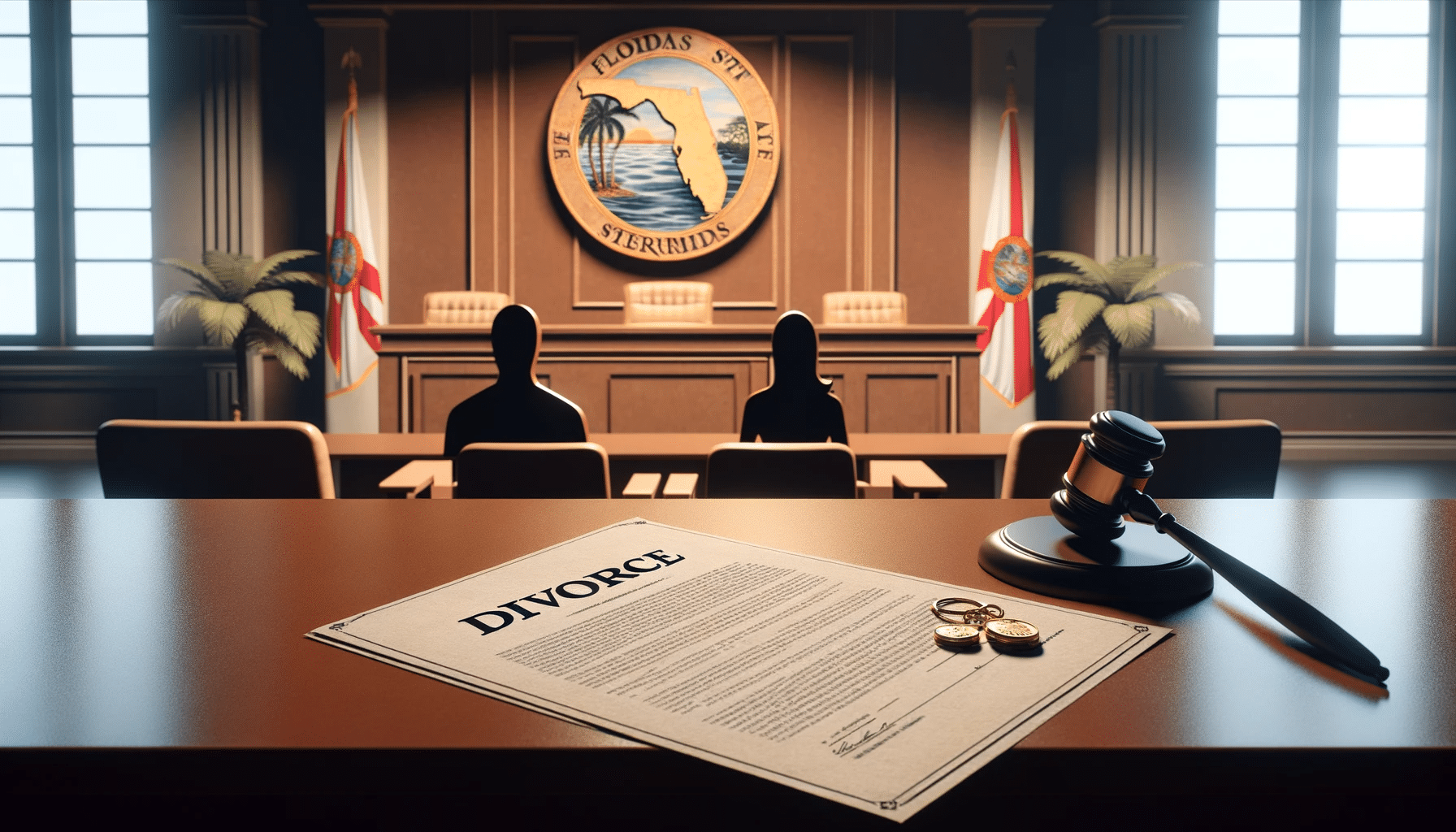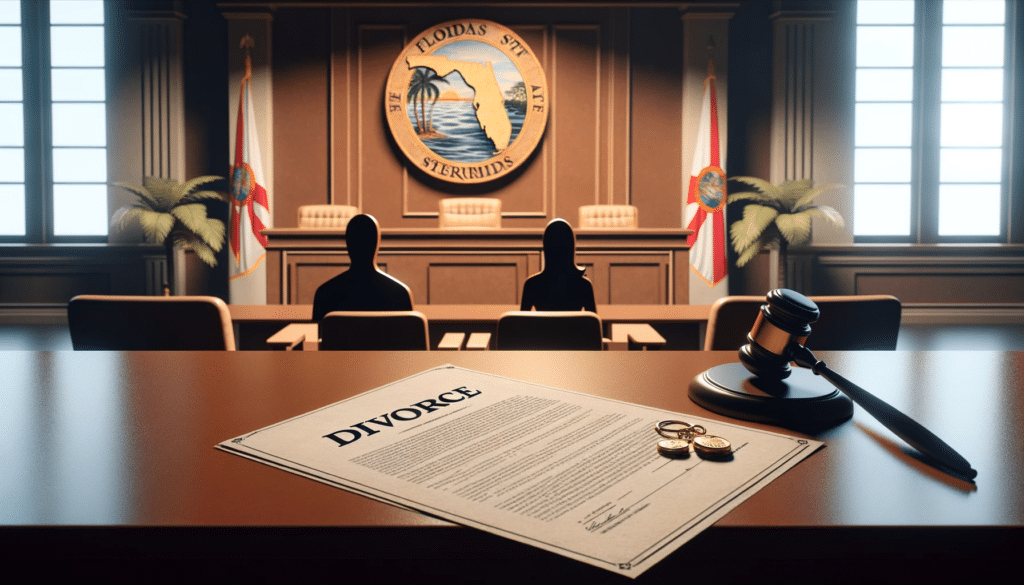Physical Address
304 North Cardinal St.
Dorchester Center, MA 02124
Physical Address
304 North Cardinal St.
Dorchester Center, MA 02124

Picture this: You’re in Florida, the sun is shining, but there’s a cloud looming over you. That cloud? The big ‘D’ – Divorce.
How long does it take to clear the skies in the Sunshine State when it comes to legally parting ways? The answer might surprise you.

Florida, known for its oranges and alligators, has its own set of rules for divorce. These rules can make the process swift or slow, depending on several factors. We’re diving into the nitty-gritty of timelines, the ‘whys’ and ‘hows’ of how long does a divorce take in Florida. What makes some divorces quicker than a Miami minute, while others drag on? Let’s unravel this together.
Stay with us as we explore the labyrinth of legal procedures, personal circumstances, and unexpected twists that define the divorce timeline in Florida. Get ready for a journey through the legal jungle of marital dissolution in the land of endless summer.
Yes, there is a waiting period for divorce in Florida. Once you file for divorce in Florida, there is a mandatory 20-day waiting period before the divorce can be finalized. This waiting period allows both parties to reconsider their decision and provides an opportunity for possible reconciliation.
During this time, it is recommended to seek legal advice and support to ensure that all necessary documents are prepared and the divorce process is properly followed. This waiting period also allows the court to schedule any necessary hearings or proceedings related to the divorce.
If you’d like to find out about the costs involved in a Florida divorce, check out our article How Much Does a Divorce Cost in Florida.
| Divorce Type | Duration |
|---|---|
| Simplified Dissolution of Marriage | As little as three weeks |
| Uncontested Divorce | Between six weeks and three months |
| Contested Divorce | Six months to a year or longer |
The length of time it takes for a divorce in Florida depends on the type of divorce. A simplified dissolution of marriage, which is available to couples who meet certain criteria such as having no minor children, can be completed in as little as three weeks. This streamlined process is often the quickest option for couples who are in agreement on all issues.
An uncontested divorce, where both parties agree on all matters including child custody, property division, and alimony, usually takes between six weeks and three months. This timeframe allows for the necessary paperwork to be filed, reviewed, and approved by the court.
On the other hand, a contested divorce, where the spouses have disagreements on various issues, can take anywhere from six months to a year or even longer. In these cases, the court may need to intervene and make decisions on matters such as child custody and support, alimony, and property division.

There are several factors that can impact the timeline of a divorce in Florida. These factors can affect the length of time it takes to reach a resolution and can potentially lead to delays in the process.
Understanding these factors can help you better navigate the divorce process and manage your expectations.
One of the key factors that can impact the timeline of a divorce is the level of cooperation between the spouses. If both parties are willing to work together and reach agreements on major issues such as child custody, property division, and alimony, the process can move forward more smoothly and quickly. However, if there is a high level of conflict and disputes, it can significantly prolong the divorce process as court intervention may be necessary to resolve these disagreements.
The complexity of the issues involved in a divorce can also impact the timeline. If there are complex financial matters, extensive assets to be divided, or disputes over child custody arrangements, it can take longer to reach a resolution. These complexities often require thorough investigation and negotiations, which can contribute to delays in the process. It is important to work with an experienced attorney who can navigate these complexities and help expedite the process as much as possible.
In some cases, the need for additional documentation or evidence can also impact the timeline of a divorce. This may include gathering financial records, obtaining appraisals of properties, or collecting evidence related to child custody matters.
The time it takes to collect and present this information can vary depending on the complexity of the case and the availability of the necessary documents. It is important to be proactive in providing the required documentation to avoid unnecessary delays.
| Factors That Impact Timeline | Impact on Divorce Timeline |
|---|---|
| Level of Cooperation between the Spouses | Can either expedite or prolong the process depending on the willingness to reach agreements. |
| Complexity of the Issues Involved | Complex matters such as finances and child custody can extend the timeline. |
| Need for Additional Documentation or Evidence | Gathering necessary documents and evidence can add time to the process. |

If you’re looking to expedite your divorce in Florida, there are several strategies you can consider. While the specific timeline will depend on the unique circumstances of your case, the following tips can help you navigate the process more efficiently:
Mediation and collaborative divorce are alternative dispute resolution methods that aim to resolve conflicts outside of court. By opting for these approaches, you can potentially reach agreements more quickly and avoid lengthy litigation processes.
Both methods involve working with a neutral third party, such as a mediator or collaborative attorney, who can help facilitate negotiations and guide you towards mutually beneficial solutions.

One common cause of delays in the divorce process is incomplete or inaccurate documentation. To expedite your divorce, make sure you have all the necessary paperwork ready and filled out accurately. This includes financial records, property inventories, and any other relevant documents.
By providing complete information upfront, you can minimize the need for additional requests or corrections, which can save time and streamline the proceedings.
Effective communication and cooperation with your spouse can significantly speed up the divorce process. Try to maintain an amicable relationship and be open to negotiations. By working together to find mutually agreeable solutions, you can avoid unnecessary disputes and reduce the need for court intervention.
Additionally, prompt responses to your spouse’s requests and attending scheduled meetings or hearings can help keep the process moving forward.
Remember, every divorce case is different, and there is no one-size-fits-all solution. It’s essential to consult with an experienced divorce attorney who can provide personalized advice based on your specific circumstances. By following these strategies and seeking professional guidance, you can increase the chances of a faster divorce process in Florida.
Divorces that involve children can add complexity to the process and may take longer to finalize. Issues such as child custody, visitation schedules, and child support need to be carefully addressed and may require court intervention if the parents cannot come to an agreement. The court’s primary consideration in these cases is the best interests of the child.
When it comes to child custody in Florida, the court aims to ensure that the child’s physical and emotional well-being is protected. Factors such as each parent’s ability to provide a stable and supportive environment, the child’s relationship with each parent, and the child’s own wishes (if they are old enough to express them) are taken into consideration.
The court typically favors joint custody, allowing both parents to be involved in the child’s life unless there are extenuating circumstances.
Child support is another important aspect of divorces involving children in Florida. The court will determine the amount of child support based on various factors, including the income of both parents, the child’s needs, and the amount of time the child spends with each parent.
Child support payments are typically made by the noncustodial parent to the custodial parent to help cover the child’s expenses, such as education, healthcare, and basic necessities.
Dealing with the complexities of divorce and child-related matters can be challenging, but it’s crucial to prioritize the well-being of the children involved. Seeking the guidance of an experienced family law attorney can provide you with the necessary support and expertise to navigate the complexities of divorce with children in Florida.
The time it takes to get a divorce in Florida changes based on a few things. You should know there’s a required 20-day wait after you file for divorce before it can be done. How long the whole divorce process takes also depends on the divorce type.
If you qualify for a simplified dissolution of marriage, it can be over in about three weeks. An uncontested divorce, where everyone agrees, usually takes around six weeks to three months. But, a contested divorce, where there’s disagreement, can last much longer – from six months to a year or more.
Different things can affect how long it all takes, like how well the spouses work together, the issues’ complexity, and the court’s schedule. Fights about things like child custody, dividing property, and alimony can make the divorce take longer. Each case is different, but you might speed things up by working well with your spouse and getting advice from a good lawyer.
When kids are part of a divorce, it gets more complicated. Things like who takes care of the kids, visiting times, and child support need careful handling. Sometimes, the court has to step in if the parents can’t agree. The main thing the court looks at is what’s best for the child.
To see how the timeline of a divorce in Florida compares to how long it takes in other states, check out our articles about how long does a divorce take in Alaska and the divorce timeline in Georgia.
The length of time it takes to get a divorce in Florida depends on several factors. In general, the process can take anywhere from a few weeks to several months or even years, depending on the type of divorce and the level of dispute between the spouses.
Yes, there is a mandatory 20-day waiting period before the divorce can be finalized in Florida. This waiting period allows both parties to reconsider their decision and provides an opportunity for possible reconciliation.
A simplified dissolution of marriage, which is available to couples who meet certain criteria such as having no minor children, can be completed in as little as three weeks.
An uncontested divorce, where both parties agree on all issues, usually takes between six weeks and three months to finalize in Florida.
A contested divorce, where the spouses have disagreements on various issues, can take anywhere from six months to a year or even longer to resolve in Florida.
Factors that impact the timeline include the level of cooperation between the spouses, the complexity of the issues involved, the need for additional documentation or evidence, and the court’s availability.
While the timeline of a divorce in Florida is largely dependent on the specific circumstances of each case, there are some steps that can potentially speed up the process. These include seeking legal advice and support from an experienced attorney, actively participating in negotiations, and being prepared with all necessary documentation.
Divorces that involve children can add complexity to the process and may take longer to finalize. Issues such as child custody, visitation schedules, and child support need to be carefully addressed and may require court intervention if the parents cannot come to an agreement.